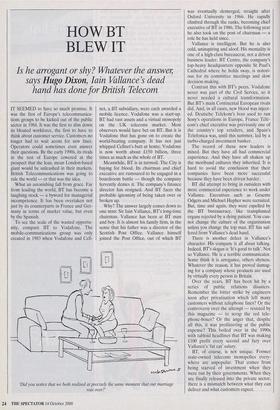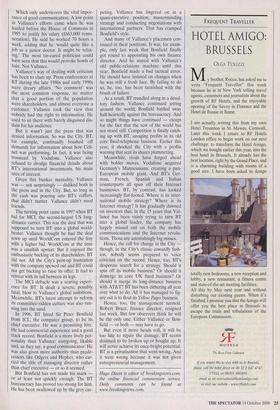HOW BT BLEW IT
Is he arrogant or shy? Whatever the answer,
says Hugo Dixon, Lain Vallance's dead
hand has done for British Telecom
IT SEEMED to have so much promise. It was the first of Europe's telecommunica- tions groups to be kicked out of the public sector in 1984. It was the first to slim down its bloated workforce, the first to have to think about customer service. Customers no longer had to wait aeons for new lines. Operators could sometimes even answer their questions. By the early 1990s, its rivals in the rest of Europe cowered at the prospect that the lean, mean London-based giant would be unleashed in their markets. British Telecommunications was going to rule the world — or that was the idea.
What an astonishing fall from grace. Far from leading the world, BT has become a laughing stock — a byword for managerial incompetence. It has been overtaken not just by its counterparts in France and Ger- many in terms of market value, but even by the Spanish.
To see the scale of the wasted opportu- nity, compare BT to Vodafone. The mobile-communications group was only created in 1983 when Vodafone and Cell- net, a BT subsidiary, were each awarded a mobile licence. Vodafone was a start-up. BT had vast assets and a virtual monopoly on the UK telecoms market. Most observers would have bet on BT. But it is Vodafone that has gone on to create the world-beating company. It has not just whipped Cellnet's butt at home; Vodafone is now worth about £150 billion, three times as much as the whole of BT.
Meanwhile, BT is in turmoil. The City is baying for blood. Its chairman and chief executive are rumoured to be engaged in a boardroom battle — though the company fervently denies it. The company's finance director has resigned. And BT faces the probable ignominy of being taken over or broken up.
Why? The answer largely comes down to one man: Sir Iain Valiance, BT's long-time chairman. Valiance has been at BT man and boy. It is almost his family firm, in the sense that his father was a director of the Scottish Post Office. Valiance himself joined the Post Office, out of which BT Did you notice that we both realised at precisely the same moment that our marriage Was over?' was eventually demerged, straight after Oxford University in 1966. He rapidly climbed through the ranks, becoming chief executive of BT in 1986. The following year he also took on the post of chairman — a role he has held since.
Valiance is intelligent. But he is also cold, uninspiring and aloof. His mentality is one of a high-class bureaucrat, not a driven business leader. BT Centre, the company's top-heavy headquarters opposite St Paul's Cathedral where he holds sway, is notori- ous for its committee meetings and slow decision-making.
Contrast this with BT's peers. Vodafone never was part of the Civil Service, so it never needed a cultural transformation. But BT's main Continental European rivals did. And, in all cases, new blood was inject- ed. Deutsche Telekom's boss used to run Sony's operations in Europe, France Tele- com's chief executive was previously one of the country's top retailers, and Spain's Telefonica was, until this summer, led by a turbo-charged investment banker.
The record of these new leaders is mixed. But they have all had commercial experience. And they have all shaken up the moribund cultures they inherited. It is hard to avoid the conclusion that their companies have been more successful because they have been driven harder.
BT did attempt to bring in outsiders with more commercial experience to work under Valiance. Executives such as Graeme Odgers and Michael Hepher were recruited. But, time and again, they were expelled by the BT bureaucracy, like transplanted organs rejected by a dying patient. You can- not change the culture of the organisation unless you change the top man. BT has suf- fered from Vallance's dead hand.
There is another defect in Vallance's character. His company is all about talking. Indeed, BT's slogan is 'It's good to talk'. Not so Valiance. He is a terrible communicator. Some think it is arrogance, others shyness. Whatever the reason, it has proved damag- ing for a company whose products are used by virtually every person in Britain.
Over the years, BT has been hit by a series of public relations disasters. Remember the bitter strike by engineers soon after privatisation which left many customers without telephone lines? Or the controversy over the attempt — resisted by this magazine — to scrap the red tele- phone-boxes? Or the anger that, despite all this, it was profiteering at the public expense? This boiled over in the 1990s with tabloid headlines that BT was making £100 profit every second and fury over Vallance's 'fat cat' salary.
BT, of course, is not unique. Former state-owned telecoms monopolies every- where are unpopular. That comes from being starved of investment when they were run by their governments. When they are finally released into the private sector, there is a mismatch between what they can deliver and what customers expect. Which only underscores the vital impor- tance of good communication. A low point in Valiance's efforts came when he was hauled before the House of Commons in 1995 to justify his salary (L663,000 remu- neration). He said he worked 70 hours a week, adding that he 'would quite like a job as a junior doctor. It might be relax- ing.' The most tin-eared politician could have seen that this would provoke howls of hate. Not Valiance.
Vallance's way of dealing with criticism has been to clam up. Press conferences at BT during the late 1980s and early 1990s were dreary affairs. 'No comment' was the most common response, no matter that a good portion of the population were shareholders, and almost everyone a customer. Valiance took the view that nobody had the right to information. He used to sit there with barely disguised dis- dain for his audience But it wasn't just the press that was denied information. So was the City. BT, for example, continually brushed off demands for information about how Cell- net was performing. In fact, it was being trounced by Vodafone. Valiance also refused to divulge financial details about BT's international investments, his main area of interest.
Given this bunker mentality, Valiance was — not surprisingly — disliked both in the press and in the City. But, so long as the cash was pouring into BT's coffers, that didn't matter. Valiance didn't need friends.
The turning point came in 1997 when BT bid for MCI, the second-largest US long- distance carrier. This was the deal that was supposed to turn BT into a global world- beater. Valiance thought he had the deal sewn up until WorldCom entered the fray with a higher bid. WorldCom at the time was a smallish upstart. But it enjoyed the enthusiastic backing of its shareholders. BT did not. All the City's pent-up frustration with the company spewed out and BT could not get backing to raise its offer. It had to retreat with its tail between its legs.
The MCI debacle was a searing experi- ence for BT. It dealt a severe, possibly fatal, blow to Vallance's global ambitions. Meanwhile, BT's latest attempt to reform its committee-ridden culture was also run- ning into the sand.
In 1996, BT hired Sir Peter Bonfield from ICL, the computer group, to be its chief executive. He was a promising hire. He had commercial experience and a good track record. Bonfield is a more lively per- sonality than Valiance: easygoing, likable and, as they say, a good communicator. He was also given more authority than prede- cessors like Odgers and Hepher, who car- ried the title of managing director rather than chief executive — or so it seemed.
But Bonfield has not made his mark or at least not quickly enough. The BT bureaucracy has proved too strong for him. He has been swallowed up by the grey car-
peting. Valiance has lingered on in a quasi-executive position, masterminding strategy and conducting negotiations with international partners. That has cramped Bonfield's style.
And many of Vallance's placemen con- tinued in their positions. It was, for exam- ple, only last week that Bonfield finally got round to appointing his own finance director. And he stayed with Vallance's old public-relations machine until this year. Bonfield made a bad tactical error. He should have insisted on changes when he was still a fresh face. By failing to do so, he, too, has been tarnished with the brush of failure.
As a result, BT trundled along in a desul- tory fashion. Valiance continued jetting around the world; Bonfield battled away half-heartedly against the bureaucracy. And so might things have continued — except for the fact that the rest of the world has not stood still. Competition is finally catch- ing up with BT, savaging profits in its old core fixed-telephone business. Earlier this year, it shocked the City with a profits warning that sent its shares plummeting.
Meanwhile, rivals have forged ahead with bolder moves. Vodafone acquired Germany's Mannesmann, creating a pan- European mobile giant. And BT's Ger- man, French, Spanish and Italian counterparts all spun off their Internet businesses. BT, by contrast, has looked increasingly flat-footed. Where is its inter- national mobile strategy? Where is its Internet strategy? It has gradually dawned on investors that, in the 15 years that Val- iance has been vainly trying to turn BT into a global leader, the company has largely missed out on both the mobile communications and the Internet revolu- tions. Those are astonishingly big misses.
Hence, the call for change in the City though, in the City's classic cowardly fash- ion, nobody seems prepared to voice criticism on the record. Hence, too, BT's desperate search for a strategy. Should it spin off its mobile business? Or should it demerge its core UK fixed business? Or should it merge its long-distance business with AT&T? BT has been dithering all year over what to do. All it has managed to fig- ure out is to float its Yellow Pages business.
Hence, too, the management turmoil. Robert Brace, finance director, resigned last week. But few observers think he will be the only one. Either Valiance or Bon- field — or both — may have to go.
But even if more heads roll, it will be too late to repair the damage. BT seems destined to be broken up or bought up. It will never achieve its once-bright potential. BT is a privatisation that went wrong. And it went wrong because it was not given entrepreneurial management.
Hugo Dixon is editor of breakingviews.com, the online financial commentary service. Daily comments can be found at www.breakingviews. corn.



















































































 Previous page
Previous page